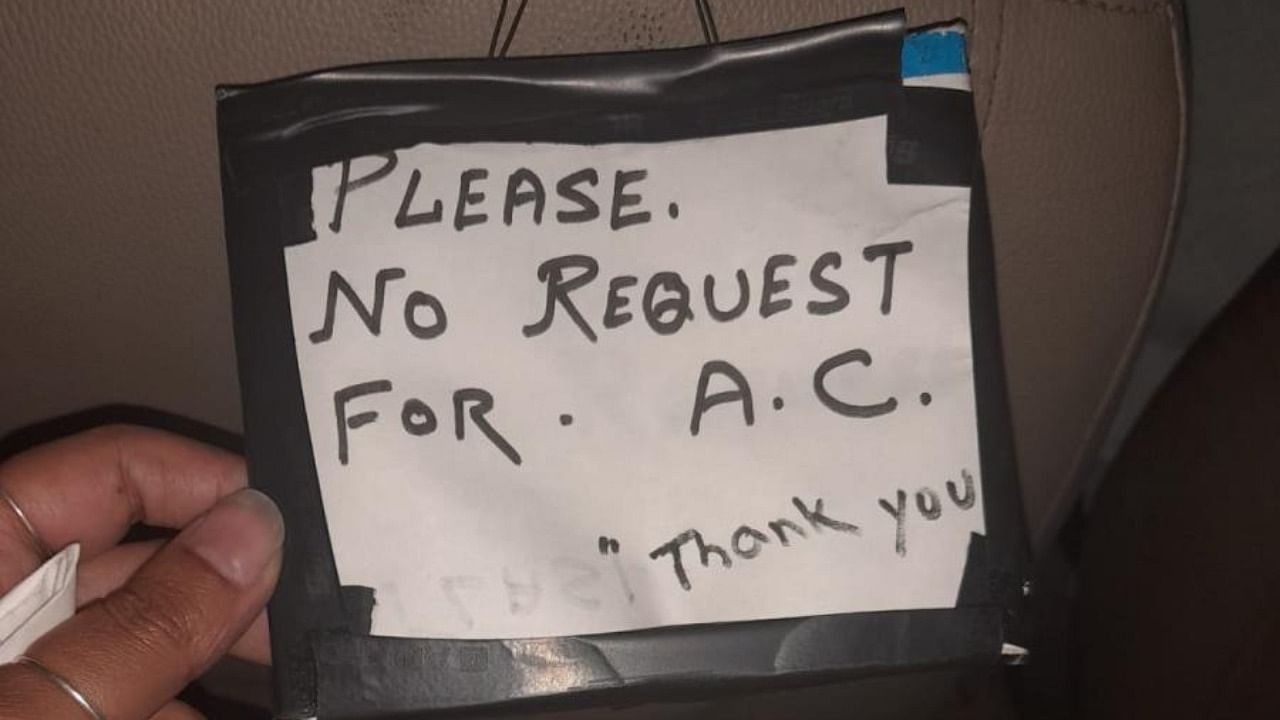
As Bengalureans swelter, cab drivers continue to refuse switching on air-conditioning (AC) during rides. They blame the incremental spike in fuel costs — Petrol and diesel was
Rs 111.09, and Rs 94.79 per litre on
April 19.
This has led to passengers shelling out extra money. Take the case of Arshiya Ali Khan. The resident of Yeshwanthpur recently paid Rs 250 to a cab driver on top of the total bill of Rs 1,200 to switch on the AC.
She says a placard on the back of his seat read: ‘Please. No request for AC. Thank you.’ “I had rented a cab from Hebbal to Whitefield. When I asked him to switch the AC on, he refused. He gave reasons ranging from Ola and Uber cabs going on strike to how these companies levy a huge commission. It was hot, so I decided to pay extra,” recalls the business development manager.
Likewise, Saurabh Srivastava, who runs a consulting firm, had to tip Rs 100 to a cab driver, who was ferrying his brother-in-law from Sarjapura Road to KSR railway station, two weeks ago. “He cited fuel price hike and payment issues as reasons for not switching on the AC,” he shares. Early this month, homemaker Varsha, a resident of Hebbal, was refused AC on the grounds that “mileage would go down”. She decided to roll down the windows and “gave one star to the driver” instead.
Low earnings
For cab drivers, it is all down to their earnings. Abu Bakar has been refusing AC to passengers as “he has no other choice.” “If I buy fuel for Rs 1,000, I can earn Rs 2,500-Rs 3,000 by running the cab without AC. With AC on, the fuel would exhaust sooner and my earnings would be down to Rs 2,000.”
On that, “the company takes a cut of 25%,” he says. In March, he was fuelling up for Rs 1,000 every third day, which has now climbed to Rs 1,500. A cab driver of nine years, he says “this is the worst time” to be in the business. “It is better I sell the car and become a porter. It wouldn’t require petrol or diesel but only human power.”
Basavaraj doesn’t deny AC to passengers because of the summer heat but he empathises with his peers who do. “Due to traffic congestion and longer signals in Bengaluru, keeping the AC on can lead to a huge loss.” Even Raghavendra doesn’t turn down the AC request as “some money is better than no money”.
The cab aggregator he is part of takes 30% commission. “If I make Rs 1,000 a day, I get less than Rs 700 after deducting GST,” he says.
Cab associations and cab hiring platforms have come to the drivers’ defence. While some have increased ride fares, others are contemplating them.
Tanveer Pasha, president of Ola Uber Driver’s and Owner’s Association, says, “After several lockdowns, the cab drivers are still trying to recover from pending rents and payments like insurance, maintenance and EMIs. At such a time, a fuel price hike is leading to no savings at all,” he says.
Ola and Uber charge around 25% commission and GST leading to more cuts in payments. “Hardly 10-15% of surcharges during peak hours come to them,” he says.
Switching the AC on leads to a drop in the mileage by at least 3 km, he says. However, Pasha notes that only 30% of drivers refuse AC to customers. “We will be protesting against the government to reduce fuel prices,” he adds.
Under Adarsh Auto and Taxi Union, there are around 200 taxis. C Sampath, general secretary, says, “Most of our taxis have permanent trips, so they have a constant income. Most other drivers have a lot of expenses to manage — with increasing traffic and a running AC, fuel burns off faster,” he adds.
‘We haven’t got complaints’
Unlike aggregators like Ola and Uber, small service providers Metrolife spoke to haven’t received such complaints.
Rajiv Vij, founder of Carzonrent, says pricing at major aggregators is regulated, which leads to fares not matching up to fuel hikes and other expenses. “In our model, customers are charged an additional amount when fuel prices go up, which balances out the impact,” he details.
GoPink cabs, a service for women, provides regular rides to the Airport. Anuradha B M, founder, says they have revised the fares by 5% in the wake of increased toll charges and soaring temperatures. In case of such complaints, Vij says the drivers in his fleet can be suspended while Anuradha says her company would warn the drivers about future bookings.
To cushion drivers from the fuel price hike, Uber has raised fares in Bengaluru by 10%, the company confirmed to Metrolife. An Uber spokesperson clarified they do not levy extra charges for AC and denying it is a violation of its guidelines. Continued non-compliance by drivers may lead to losing access to the Uber app, the spokesperson adds.
Ola did not respond to Metrolife’s request for a comment on this story.
How to complain
Indra Dhanush, a High Court lawyer, says most of these aggregators do not have an effective redressal system. “Effective action is not taken often as all issues are addressed online. Some passengers raise their concerns online or with proof, and companies either offer a full refund, cashback or coupon. The issue stops there,” he says. A complaint can be filed under the Consumer Protection Act, 1986, Section 2(o) and Section 2(g), which defines the nature of service and deficiency respectively.
Price hike
Petrol: Rs 100.58 on January 1 to Rs 111.09 on April 19
Diesel: Rs 85.01 on January 1 to Rs 94.79 on April 19